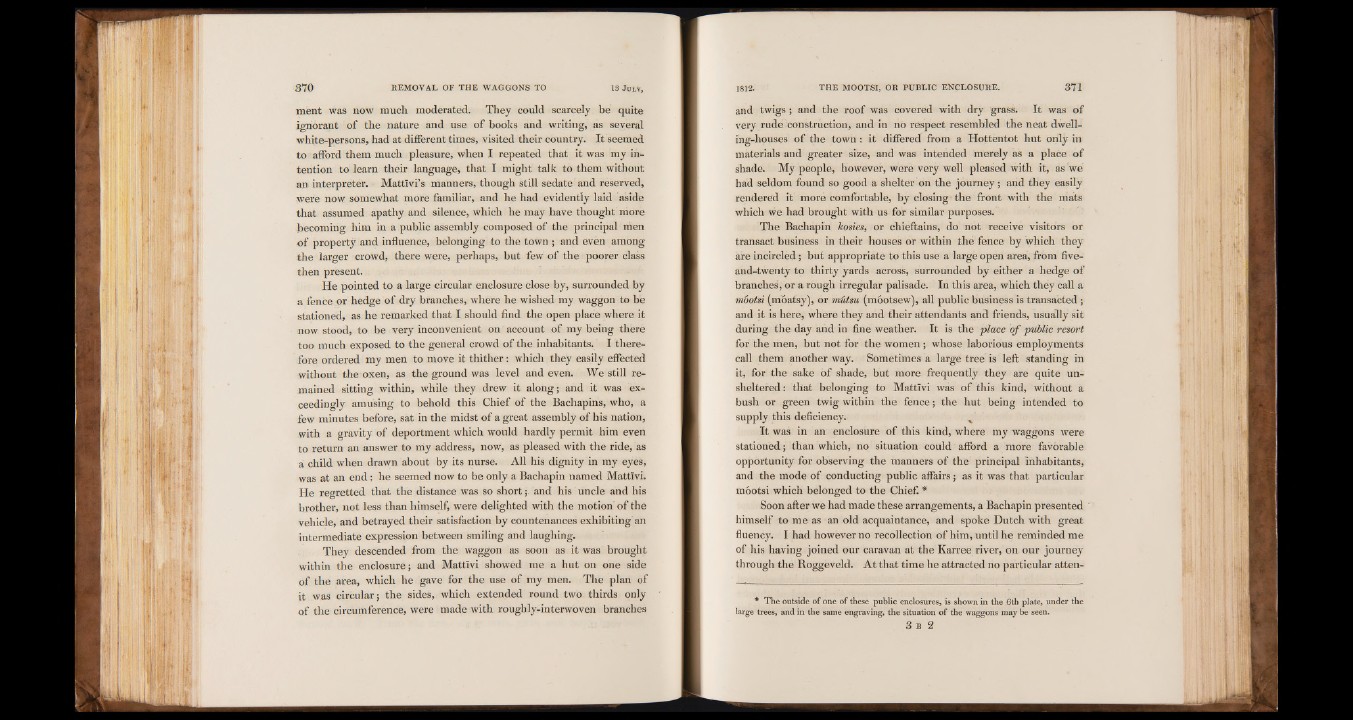
ment was now much moderated. They could scarcely be quite
ignorant of the nature and use of books and writing, as several
white-persons, had at different times, visited their country. It seemed
to afford them much pleasure, when I repeated that it was my intention
to learn their language, that I might talk to them without
an interpreter. Mattivi’s manners, though still sedate and reserved,
were now somewhat more familiar, and he had evidently laid aside
that assumed apathy and silence, which he may have thought more
becoming him in a public assembly composed of the principal men
of property and influence, belonging to the town ; and even among
the larger crowd, there were, perhaps, but few of the poorer class
then present
He pointed to a large circular enclosure close by, surrounded by
a fence or hedge of dry branches, where he wished my waggon to be
stationed, as he remarked that I should find the open place where it
now stood, to be very inconvenient on account of my being there
too much exposed to the general crowd of the inhabitants. I therefore
ordered my men to move it thither: which they easily effected
without the oxen, as the ground was level and even. We still remained
sitting within, while they drew it along; and it was exceedingly
amusing to behold this Chief of the Bachapins, who, a
few minutes before, sat in the midst of a great assembly of his nation,
with a gravity of deportment which would hardly permit him even
to return an answer to my address, now, as pleased with the ride, as
a child when drawn about by its nurse. All his dignity in my eyes,
was at an end: he seemed now to be only a Bachapin named Mattivi.
He regretted that the distance was so short; and his uncle and his
brother, not less than himself, were delighted with the motion of the
vehicle, and betrayed their satisfaction by countenances exhibiting an
intermediate expression between smiling and laughing.
They descended from the waggon as soon as it was brought
within the enclosure; and Mattivi showed me a hut on one side
of the area, which he gave for the use of my men. The plan of
it was circular; the sides, which extended round two thirds only
of the circumference, were made with roughly-interwoven branches
and twigs; and the roof was covered with dry grass. It was of
very rude construction, and in no respect resembled the neat dwelling
houses of the town: it differed from a Hottentot hut only in
materials and greater size, and was intended merely as a place of
shade. My people, however, were very well pleased with it, as 'we
had seldom found so good a shelter on the journey; and they easily
rendered it moré comfortable, by closing the front with the mats
which we had brought with us for similar purposes.
The Bachapin leosies, or chieffains, do not receive visitors or
transact business in their houses or within the fence by which they
are incircled; but appropriate to this use a large open area, from five-
and-twenty to thirty yards across, surrounded by either a hedge of
branches, or a rough irregular palisade. In this area, which they call a
móotsi (moatsy), or mútsu (móotsew), all public business is transacted;
and it is here, where they and their attendants and friends, usually sit
during the day and in fine weather. It is the place of public resort
for the men, but not for the women ; whose laborious employments
call them another way. Sometimes a large tree is left standing in
it, for the sake of shade, but more frequently they are quite unsheltered
: that belonging to Mattivi was of this kind, without a
bush or green twig within the fence; the hut being intended to
supply this deficiency. f
It was in an enclosure of this kind, where my waggons were
stationed; than which, no situation could afford a more favorable
opportunity for observing the manners of the principal inhabitants,
and the mode of conducting public affairs; as it was that particular
móotsi which belonged to the Chief. *
Soon after we had made these arrangements, a Bachapin presented
himself to me as an old acquaintance, and spoke Dutch with great
fluency. I had however no recollection of him, until he reminded me
of his having joined our caravan at the Karree river, on our journey
through the Roggeveld. At that time he attracted no particular atten*
The outside of one of these public enclosures, is shown in the 6th plate, under the
large trees, and in the same engraving, the situation of the waggons may be seen.